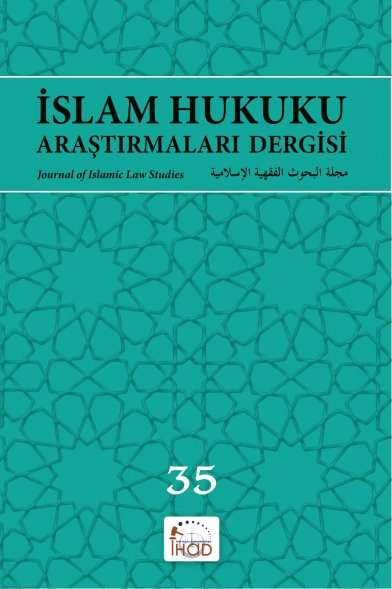İslâm Yargılama Hukukunda Dijital Delillerin Değeri
İletişim ve bilgi teknolojileri alanındaki buyuk gelişmeler; dijital bilgi ve verilerin yargılama hukukunda ispat vasıtası olarak kullanılması imkanını sağlamıştır. Ancak, yeni oluşları ve dijital yapıları sebebiyle İslam hukuku acısından bu tur deliller uzerinde henuz yeterli derecede araştırmalar yapılmamıştır. Bu araştırma, dijital bilgi ve verilerin İslam yargılama hukukunda delil sayılıp sayılamayacağını, mahkeme kararlarının onlar uzerine kurulmasının meşru olup olamayacağını, gizlilik hakkının korunması ile bu ispat vasıtalarına ulaşmanın celişip celişmediğini acıklamayı hedeflemektedir. Bu bağlamda, calışmada oncelikle dijital delil ceşitleri, ozellikleri ve guvenilirlik dereceleri tanıtılmış ve İslam yargılama hukukundaki ispat sisteminde bu gibi delillerin kabulunun imkanı meselesi ele alınmıştır. Daha sonra bu delillerin fıkhi niteliği, ispat gucu, hakimin onları kabul veya reddetme yetkisi ile onları kullanma şartları acıklanmıştır. Ayrıca ozel hayatın gizliliğini ihlal etmeksizin bu tur delillere ulaşmanın meşru sayılıp saylamayacağı ve mahkeme dışında yapılan ikrarın ispatında dijital bilgilerin delil kabul edilip edilemeyeceği konuları da bu makalede anlatılmaya calışılmıştır.
Anahtar Kelimeler:
İslâm Yargılama Hukuku, Dijital Delil, Karîne, Güvenilirlik, Gizlilik
Authentic Digital Evidence in the Islamic Judicial System
The massive development and spread of communication and information technologies have provided abundant materials for digital data and information that can be used as evidence in judicial substantiation. However, this type of evidence has been overlooked in the jurisprudential research field due to its novelty and special digital nature. Therefore, this research aims to demonstrate the authenticity of this digital evidence in the Islamic judicial system. It addresses the credibility of relying on it in building the judicial verdict, and the debate around the right to privacy and the legality of accessing it. I do this by defining it, detailing its types and characteristics and the degree of credibility in it. I also state the nature of the Islamic judicial system and the extent of its acceptance of such evidence. I then move to outlining the jurisprudential adaptation of this evidence, the conditions for working with it, its evidentiary power, the judge’s authority to accept or reject it and the legality of obtaining it without violating the right to personal privacy. Finally, the research discusses the authority to prove and pass the verdict made outside the Judicial Council.
Keywords:
Islamic Judicial System, Digital Evidence, Presumption, Credibility, Privacy,
- ISSN: 1304-1045
- Yayın Aralığı: Yılda 2 Sayı
- Başlangıç: 2004
- Yayıncı: Gençleri Evlendirme ve Mehir Vakfı
Sayıdaki Diğer Makaleler
İslam Hukuku Perspektifinden Eşcinsel Bireylerin Çocuk Edinme/Sahibi Olma Problemi
Bir Fetvâ Konusu Olarak Muhâlea: Pîrîzâde’nin Muhâlea Risâlesi (Tahlil ve Tahkik)
Usûl-i Fıkıh Açısından Kur’an’ın Mahiyeti ve Gayesi Hakkında Birkaç Söz
Klasik Fıkıh Doktrininde Cariyenin Tesettürü İle İlgili Yaklaşımlar
İbn Nüceym’in Fuzûlînin Kıydığı Nikâhın Sıhhatine Dair Fıkhî Risâlesinin Çeviri ve Değerlendirmesi
